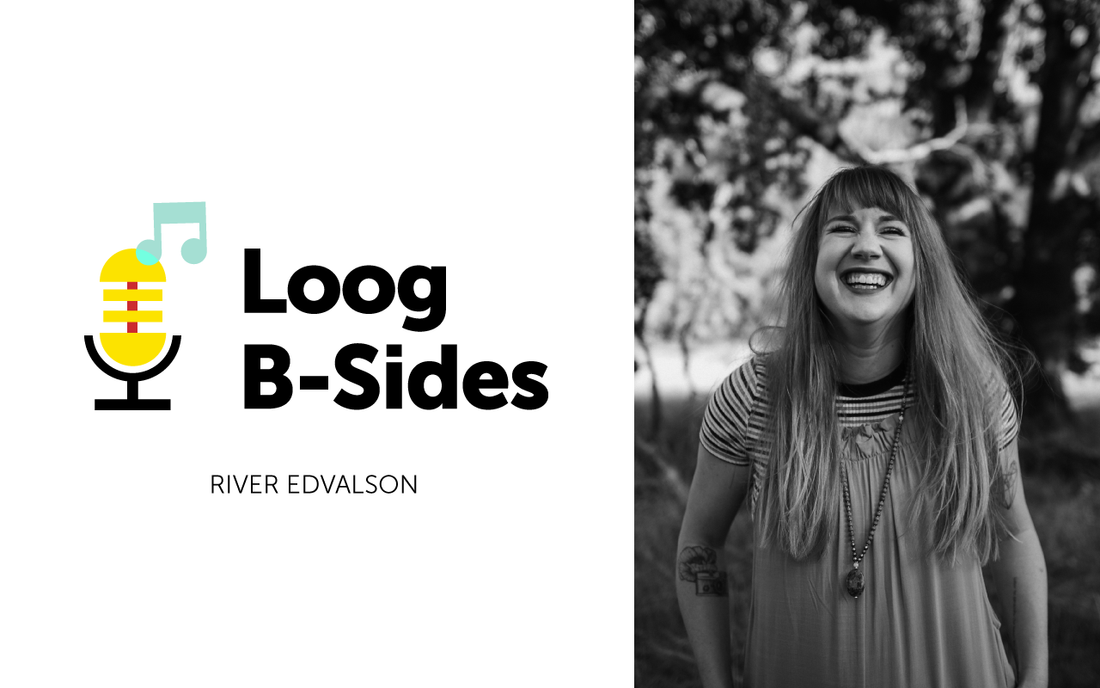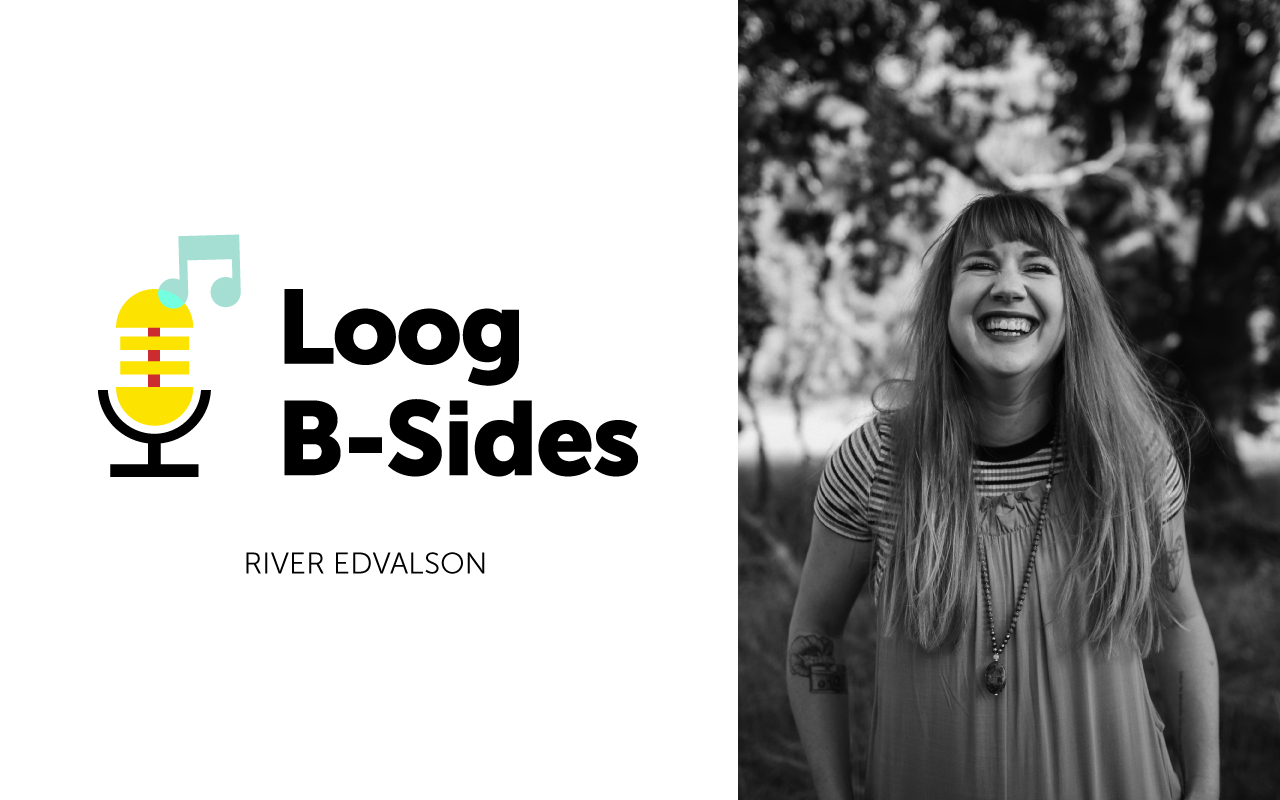
Loog B-Sides: From One Loog Parent to Another

This is the third episode of Loog B-Sides, a series of conversations that celebrates and shines a spotlight on some of our fave Loog Community members. You can also listen to excerpts from this feature and others from Loog B-Sides on Spotify.
We first learned about River Edvalson when she tagged us in a picture of her son sporting a Loog Mini last summer. A few clicks later, we were hooked on her thoughtful, absolutely relatable Instagram captions. From her work as a doula, to being a parent during the pandemic, to her amazing photography, our team spent the rest of the afternoon sharing our faves and relating - hard.
So when the idea for Loog B-Sides came up, we knew this was our chance to hit her up and actually have a live (well, via Zoom) conversation with her. We always like saying that we have the best people as customers here at Loog and River might just be the perfect example.
In this episode, River gives her best advice for parents expecting their second child, how to prepare kids for siblinghood, how to make postpartum experiences better (yes, it can be done!), and how the pandemic actually offered her family a silver lining that we think y’all would really relate to. Let’s get into it!
Don’t feel like reading? You can also listen to an excerpt of River’s interview on Spotify.
What does a doula do exactly for those people who do not know?
A lot of people confuse doulas and midwives. Doulas provide educational, physical and emotional support through pregnancy, birth, and postpartum. We are not trained to medically deliver babies. We do not provide medical support. That's the big difference. Every doula is very different in how they offer their services. Some focus primarily on birth, some focus primarily on postpartum. Some consider themselves to be full-spectrum doulas, they do everything from fertility, pregnancy loss, grief, support through postpartum and first year of the baby's life. I consider myself a full-spectrum doula.
When I interview to work with a couple they usually ask if I take “the place of a partner” and that couldn't be further from the truth. We're there to support and make sure and facilitate the partner as a support person. It's so easy to feel lost as a dad. If they don't know what to do, we're there to help show them so they don't feel lost.
A lot of people associate doulas with home birth, but more and more people are looking to have doulas in the hospital. There's so much more to birth than laying on a bed and having an OB tell you just to push like you see in the movies. As wonderful as most OBs and nursing staff are, the reality is that they don't have the time to be hands-on with their patients in the way they need. That's where doulas kind of fill the gap, especially in the hospital setting. There is evidence that the presence of a doula can help lower birth interventions.
How exactly does a doula help during postpartum?
No matter what your birth experience was like, postpartum can be pretty abysmal. You've had all this care during your hospital stay or during your home birth, and then you go home with a newborn and you don't see your OB for at least six weeks. It's a very lonely experience, especially if it's your first baby. Here in the US, we don't always have an immediate community able to help us and step in.
As a society, we're not very good at showing that vulnerability and that's not really taught to us. I couldn’t ask for help after my first one was born. If I’d have felt it was safe to ask for help, I probably would have done so much better as a new mom. But It's hard. How do you tell your partner or your mother-in-law or your sister, “if someone doesn't come home to my child right now, I'm going to go insane because I'm exhausted and I need food and I haven't slept”? That's a really hard thing to say.
Having that postpartum support is extremely helpful and not just for heterosexual couples. I support couples who are adopting or who've gone through surrogacy, etc. Having someone to come in when you are frustrated or in need of a shower. Having someone come in who is not going to judge your laundry pile that's growing. Who's going to come in and make you a hot meal, hold your baby while you go and shower, give you resources and education. Who's going to take your baby and say, “Hey, you two should go for a walk for the next 20 minutes and get some fresh air. And I'm going to be here holding your baby. Your baby is safe.” That can be such, such a shift in how you experience postpartum, having that support, knowing that you have someone to lean on, it can be immensely helpful.
I usually stay with a family for the first full year of a baby's life. And then afterwards, I still talk to a lot of my clients as they're going through struggles. Doulas build pretty strong relationships with their clients. At least for me, they become friends more than just clients. So it's kind of a lifelong process in some situations.
A lot of Loog parents are expecting their second, or even third child. What’s the biggest challenge there? What advice can you give them?
So I know from my own experience in watching some of my clients go through having their first and then second child, second pregnancies are exhausting with a toddler.
People worry about how dramatically this is going to change their older child's world. And what’s their support system going to be like with the toddler? I've had clients whose families live on the east coast, and they’re here on the west coast, and they don't know anybody. In the US a lot of families live really far apart.
I've advised my clients to set up a meal train, so people can bring you food for the first couple of weeks. There's an online website for creating meal trains and people can sign up. Then you put a little box on your front door and they drop meals off. That is so immensely helpful.
Also making a plan with your partner, or if you are single making a plan with your family or your support system in case, for example: you have a C-section and need to be in bed for the first couple of weeks. Who's going to come help? What do you need?
Oftentimes we will get overwhelmed by family: they want to help but they don't always know how to help. So you should mentally prepare yourself to ask for help and to be very specific with what you need help with. “Hey grandparents, if you want to come over and hold a baby, that's awesome. Can you also take my three-year-old for a walk so that I can have some time with the baby? Can you hang out with them for an hour while I take a shower?”
What’s your advice on how to approach the issue with the other children or toddlers in the house?
With my toddler, we did a lot of reading ahead of time. She had a baby doll that she spent a lot of time taking care of. With my son, we had midwife care. We had prenatal sessions at home and so we involved her. She got to listen to the baby's heartbeats and we just went through all of it with her. So by the time the baby was born, she just kind of thought it was normal and she was prepared for it. The more we talked about it and the more we set expectations, the smoother the transition was for her.
Now that being said, there's always going to be some emotional adjustments afterward, like “who is this creature who is taking over my mom's lap, when I love to snuggle all day long.” I think it was really important for us that my partner really focused on her a lot after the baby was born. That kind of gave him something to do when I was breastfeeding, and then when I would need time to myself, they would do a lot of bonding with the baby and she would help change his diaper and just be very involved. I think letting them know that they're loved and also giving them space and time as individuals too, so that they can bond with you still, I think that's really important.
How has the pandemic affected home life for your clients, especially concerning their kids?
Due to the pandemic, it feels like for kids that a big challenge lately has been mental health issues, with just so many changes in going to online school or missing school. I think that's been a challenge for a lot of people to navigate. For parents especially, trying to figure out how to help our kids through these situations while also taking care of ourselves and trying to juggle school and life and work and all of the things that we do; it's a lot.
But a lot of people talk about the negative changes, and I, from the start, have thought there's a huge silver lining: it really forces people to reevaluate their priorities. I know that for even just my family, it's really forced us to look at, “okay, why are our lives so busy all the time? Why is that okay? Do we really want to spend that much time away from each other?”
And first, we were already, like, “oh, we're really gonna miss these things I do.” But then, as time has continued, we don't miss them nearly as much as we thought. It's really forcing us to evaluate, “do we really need to do so many extracurricular activities with our kids?” I certainly don't miss my kids getting off of school and then having to drive them to five different activities and then not seeing my spouse until we're in bed at 10 o'clock at night. I don't miss that at all.
You can listen to an extract of River's interview on Spotify.

